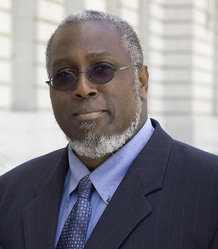Name: Eric Smith
Age: 53
Occupation: Executive Director of Green Depot
District: 10
URL for website http://ericsmith10.com
Neighborhood You Live In: Dogpatch
Date Questionnaire Returned: September 6, 2010
1. How often do you rely on Muni to get you around town? If not, what do you use instead?
Rarely. I either drive my 2001 VW Beetle which runs exclusively on 100% biodiesel made from recycle vegetable oil, or ride my bicycle. Either way, I try to save the planet one mile at a time!
What would make it easier for you to choose Muni over other forms of transportation?
More frequent service and stops near destinations I frequent.
2. What are the primary concerns of Muni’s owners (aka riders) about transportation and Muni in your District?
If we can reform MUNI in a way that makes it a real choice for transportation, we can take more cars off the road. I would prioritize speeding up MUNI, especially within District 10. MUNI is fundamental for getting around the District and the City, and yet it takes much longer than driving does to get downtown from District 10, making MUNI not a competitive option time-wise. Also, I would aggressively promote a real transit-first agenda with transit that services all areas from Visitation Valley to Mission Bay. I am working with the Bicycle Coalition, the Transit Riders Union, the Mission Bay CAC, and ENTRIPS to develop a comprehensive transit plan that connects our communities to downtown and other neighborhoods and makes sure that high-speed rail doesnʼt negatively affect that plan.
3. As a Supervisor, you will serve on the Board of the San Francisco County Transportation Authority. What is the role of the SFCTA, and what would you set as priorities for the agency in the next 4 years?
Yes, I would gladly serve on the SFCTA. Iʼd say accountability, centralization of services and responsible budgeting are my biggest priorities.
4. Difficult decisions often have to be made regarding transportation in San Francisco. Sometimes a well-researched project may have loud, angry opponents, or a popular project may not be the best for City residents and for San Francisco’s transportation infrastructure.
How would you make a decision under these kinds of circumstances? (Feel free to cite a similar situation from your past experience as an example – it doesn’t have to be transit related)
Solutions to problems must involve all sides, stakeholders and the community at the table. I would actively encourage that. My candidacy is about unity, about giving the diverse voices in our community an opportunity to not only be heard, but also listened to.
5. What is the Fix Muni Now charter amendment? Do you support it? (N) Why or why not?
I am not in favor of Prop G, a measure that places the burden on our transit drivers to solve MUNIʼs financial woes. There must be a comprehensive approach that looks at MUNIʼs entire structure.
6. One (of many) causes for Muni’s perennial budget woes was the illegal seizure of state gas tax money by Governor Schwarzenegger and the Legislature. This has left a large hole in Muni’s income (as well as every transit agency in CA). How would you make up this gap in Muni revenue?
Would you support
– a local funding source or sources (fees, taxes, or other type of revenue) to avoid future problems caused by the state?
– would you achieve savings through cuts to Muni’s budget, fare increases, etc.
– or, do you have other ideas on how to get Muni out of its annual financial woes? (You can choose more than one option, but just explain it clearly)
I oppose the Governorʼs raids on state funds from either MUNI or money for education. I will work to find and implement progressive measures to adequately fund MUNI and hold management and the MTA Board accountable for reliability, performance, and safety. I would look at ways of providing funds for capital projects through the Transportation Authority to reduce operating costs (such as timely vehicle replacement and not expansion like the Central Subway). I am interested in looking at the peak- hour congestion measures now being proposed and in learning from what is being done in London. Itʼs time for people who drive in congested areas to face disincentives for doing so, possibly including fees based on the weight or fuel efficiency of the vehicle.
7. Finally, tell us a story about a funny or unique experience you’ve had on Muni.
My favorite MUNI experience was during the pilot biodiesel program back in 2006. MUNI loaned the SF Department of the Environment a small, diesel bus to experiment with and it was great to see the first ever City vehicle running on biodiesel! As a member of the SF Biofuels Cooperative and later as Executive Director of Green Depot, we successfully brought the solution of biodiesel to D10 neighborhoods where diesel pollution is responsible for asthma in 1 of 6 children and a host of other chronic health problems. I helped lead the push that resulted in Mayor Newsomʼs executive order that converted San Francisco’s entire diesel fleet to biodiesel, making it the largest City in the world to do so. I also assisted the SF Bay Railroad in becoming the first rail yard in the country to run on biodiesel.



